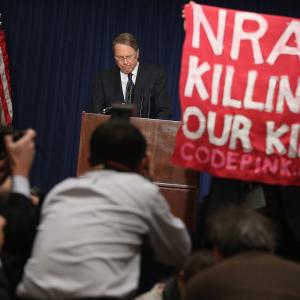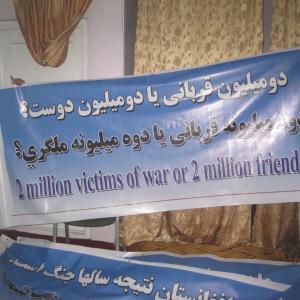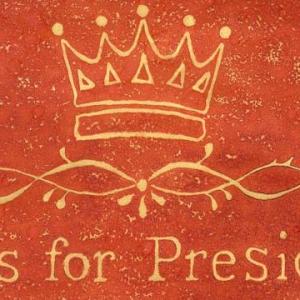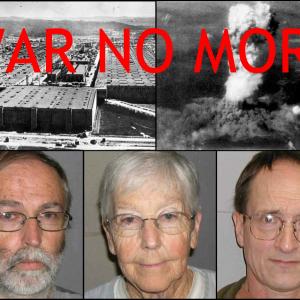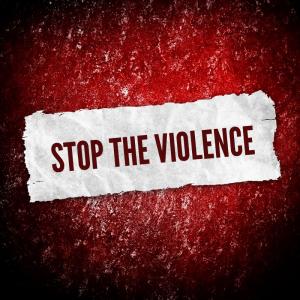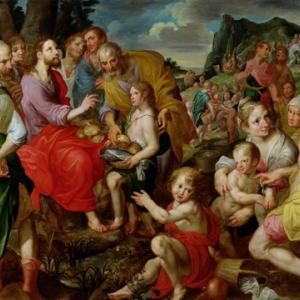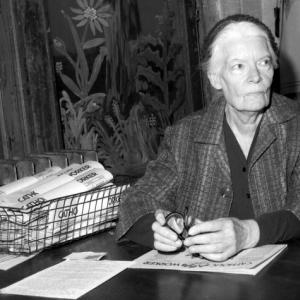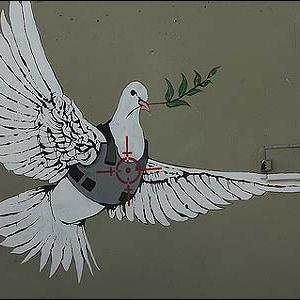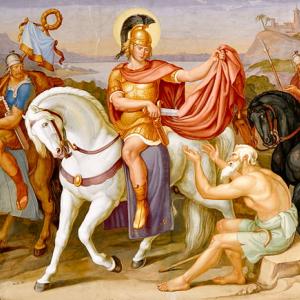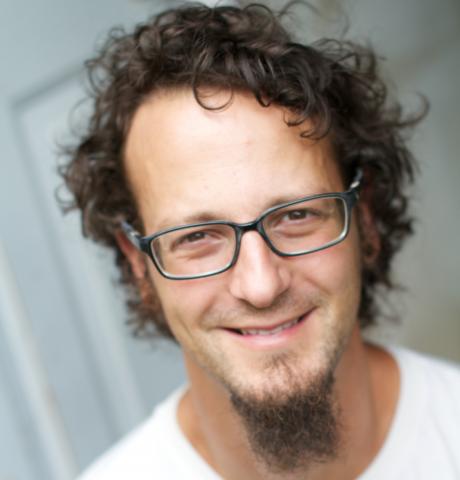
Shane Claiborne is a Red Letter Christian and a founding partner of The Simple Way community, a radical faith community that lives among and serves the homeless in the Kensington neighborhood of Philadelphia. He is the co-author, with Chris Haw, of Jesus for President. His newest book is Executing Grace: Why It is Time to Put the Death Penalty to Death.
Posts By This Author
On Syria: Two Wrongs Don't Make a Right
Right after 9/11, I asked a kid in my neighborhood what we should do in response. His answer: “Those people did something very wrong ...” He thought pensively and continued, “But two wrongs don’t make a right.”
As Martin Luther King taught us, you cannot fight fire with fire, you only get a bigger fire. You fight fire with water. You fight violence with nonviolence. You fight hatred with love.
As a Christian, a follower of Jesus the Prince of Peace, I am deeply troubled about the possibility of a military response to the violence in Syria. Jesus consistently teaches us another way to respond to evil, a third way – neither fight nor flight. He teaches that evil can be opposed without being mirrored, oppressors resisted without being emulated, enemies neutralized without being destroyed.
Friends Without Borders
Can getting to know people on the "other side" help tear down the walls between us? It already has.
IT'S BEEN SAID that one of the most radical things Jesus did was to eat with the wrong crowd. Undoubtedly, folks on the Left were frustrated with Jesus for making friends with Roman tax collectors. And folks on the Right were surely ticked at him for hanging out with Zealots. Dinner must have been awkward with both of them at the table; after all, Zealots killed tax collectors for fun on weekends.
But Jesus was a subversive friend, a scandalous bridge-builder, a holy trespasser. Just as we are known by the company we keep, so was Christ—accused of being a "glutton and a drunkard, a friend of tax collectors and sinners" (Luke 7:34). He was put on trial for being a rabble-rouser and a traitor. He got in trouble with the religious elite for crossing the line, overstepping purity laws and cultural norms, and disrupting the status quo. His love had no bounds and his friendships defied categories. He insisted on calling his followers friends: "I no longer call you servants, because a servant does not know his master's business. Instead, I have called you friends" (John 15:15).
Jesus made friends—with folks who adored him and folks who hated him. He sat with the woman at the well, washed the feet of his disciples, wept at the death of his buddy Lazarus, and loved his mom and dad. But his love went beyond borders. He redefined family, inviting his followers to be "born again" and discover an identity that runs deeper than biology. He challenged the chosen and included the excluded—in the family of God.
I wonder who Jesus would be hanging out with if he were around today?
Two Children Killed in Afghanistan by NATO Forces
THIS JUST IN — horrific news from our friends in Kabul. Over the weekend two kids, age 7 and 8, were killed by NATO forces while herding cattle in the Uruzgan Province in Afghanistan.
The Afghan Peace Volunteers, with whom Shane visited a few weeks ago, took to the streets in nonviolent protest.
They were accompanied by a couple of cows, as a reminder of the innocence of these children who were killed alongside their livestock.
They carried signs that read: “We are those 2 children.” Here is a video they sent us:
What Would Jesus Say To the NRA?
What does the birth of the baby Jesus 2,000 years ago have to offer the violent, troubled world we live in? Or what would Jesus say to the NRA?
I want to suggest — a lot. A whole lot.
Jesus entered the world from a posture of absolute vulnerability — as an unarmed, innocent child during a time of tremendous violence. The Bible speaks of a terrible massacre as Jesus was born, an unspeakable act of violence as King Herod slaughters children throughout the land hoping to kill Jesus (which the church remembers annually as the massacre of the Holy Innocents).
Perhaps the original Christmas was marked more with agony and grief like that in Connecticut than with the glitz and glamour of the shopping malls and Christmas parades. For just as Mary and Joseph celebrated their newborn baby, there were plenty of other moms and dads in utter agony because their kids had just been killed.
From his birth in the manger as a homeless refugee until his brutal execution on the Roman cross, Jesus was very familiar with violence. Emmanuel means “God with us.” Jesus’s coming to earth is all about a God who leaves the comfort of heaven to join the suffering on earth. The fact that Christians throughout the world regularly identify with a victim of violence — and a nonviolent, grace-filled, forgiving victim — is perhaps one of the most fundamentally life-altering and world-changing assumptions of the Christian faith. Or it should be.
So what does that have to do with the NRA? Underneath the rhetoric of the gun-control debate this Christmas is a nagging question: are more guns the solution to our gun problem?
I Found Peace in Kabul
Afghanistan is one of the most desperate, beat up places in the world. Forbes magazine has called it the most dangerous nation on earth. Over 30 years of war have left 2 million people dead, and much of the country in chaos. But even in the most troubled places on earth, there always seems to be a little group of people who refuse to accept the world as it is and insist on building the world they dream of, a little group of people who believe despite the evidence and watch the evidence change.
A few years ago, I began to hear about a little group of young people in Afghanistan doing exactly that. Many of them had seen their loved ones, friends and family killed. They were tired of blood. Tired of war. And so they began to organize, and educate, and train themselves for peace. They studied the heroes of nonviolence, Gandhi and King. A few of them even travelled to India to learn nonviolence and community from Gandhi’s ashram. Now they have their own ashram in Kabul, where dozens of them live together and work for peace.
And they have begun to build a movement: marching in the streets, planting trees, building parks as monuments of peace. They started wearing blue scarves as a symbolic reminder that there is one blue sky that connects us all, and now their little movement is catching the world’s attention. It is a movement of friends without borders.
The motto of their movement is this: “A little bit of love is stronger than all the weapons in the world.”
Jesus for President 2012
Jesus for President. Amish for Homeland Security. We had some good ideas for serious change in America.
As Christians, we became convinced that the issues –things like immigration and health care, and the growing disparity between the rich and the poor – these things matter to God. We see more than 2,000 verses in Scripture that talk about how we care for the poor and marginalized. And too much of the Christianity we grew up with was so heavenly minded that it was no earthly good. So the issues matter to us.
But, we were, and still are, political refugees in post-religious-right America. No party feels like home. No candidate seems to value the things we see Jesus talking about in the Sermon on the Mount. Federal budget cuts have begun to look like the antithesis of the Beatitudes, where Jesus blesses the poor and hungry rather than the rich and wealthy. You get the sense that if Mary proclaimed her famous “Magnificat” in Luke’s Gospel today — where “God fills the hungry with good things and sends the rich away empty” — she’d be accused of promoting class warfare. As one theologian said, “Our money says in God we trust … but our economy looks like the seven deadly sins.”
What would America look like if Jesus were in charge?
Tony Campolo and Shane Claiborne: A Conversation About Politics
TONY CAMPOLO: Shane, I have a question to ask that may make you squirm a little bit. From hearing you talk and reading your books, you often seem to suggest that Christians not participate in the political process, and that political activism is somewhat futile. Have I understood your position correctly?
SHANE CLAIBORNE: The question for me is not are we political, but how are we political? We need to be politically engaged, but peculiar in how we engage. Jesus and the early Christians had a marvelous political imagination. They turned all the presumptions and ideas of power and blessing upside down.
The early Christians felt a deep collision with the empire in which they lived, and with politics as usual. They carelessly crossed party lines and built subversive friendships. And we should do that too. To be nonpartisan doesn’t mean we’re nonpolitical. We should refuse to get sucked into political camps and insist on pulling the best out of all of them. That’s what Jesus did—challenge the worst of each camp and pull out the best of each. That’s why we see Essenes, Zealots, Herodians, Pharisees, and Sadducees all following Jesus and even joining his movement. But they had to become new creations. They had to let go of some things. Jesus challenged the tax-collecting system of Rome and the sword of the Zealots.
So to answer the question, I engage with local politics because it affects people I love. And I engage in national politics because it affects people I love.
Governments can do lots of things, but there are a lot of things they cannot do. A government can pass good laws, but no law can change a human heart. Only God can do that. A government can provide good housing, but folks can have a house without having a home. We can keep people breathing with good health care, but they still may not really be alive. The work of community, love, reconciliation, restoration is the work we cannot leave up to politicians. This is the work we are all called to do. We can’t wait on politicians to change the world. We can’t wait on governments to legislate love. And we don’t let policies define how we treat people; how we treat people shapes our policies.
TONY CAMPOLO: So you are not calling for noninvolvement in politics. Instead, you are warning Christians not to put their trust totally in political powers. You are calling them to exercise an ongoing involvement with the political process, to constantly speak truth to power in those places where power seems to be asserting itself in ways that are contrary to the will of God.
Ku Klux Clowns
I started my Tennessee sabbatical with a story about three peace activists who recently shut down the Y12 bomb plant here in Oak Ridge with a stunning protest, armed only with a bible and flowers.
I figure I’ll end my sabbatical with another great story of East Tennessee mischief.
This is the story of one of my favorite flash-mob actions, which happened right here in Knoxville. And this year marks its five-year anniversary.
It all happened on May 26, 2007.
Word had begun to spread that a group of white supremacists — including members of the KKK — were converging here in Knoxville, Tenn., for a rally in a park downtown. It was on the news and in the papers.
Many locals were pretty upset by the public display of racism and hatred. Even though many of the folks connected to the hate-group were coming from other states, they had obtained a permit to gather and publicly proclaim their hate-filled message of White Power.
But they had no idea what was coming.
A group of locals had decided neither to cower away in fear nor to fight fire with fire....Instead they decided to meet hatred with humor.
Shane Claiborne: Of Slingshots, Plowshares, and Kitchen Hammers
I just arrived in Tennessee for a little sabbatical in the hills where I grew up. As I settled into my old childhood room again for a week or so of rest, I noticed a pile of newspaper articles my mom placed by the toilet. She's gotten into the habit of putting clippings of articles there that she thinks I'll enjoy reading while having my special time in the bathroom.
One of the articles was an extraordinary front-page story in the Knoxville News Sentinel about three peace activists who shut down the Y-12 nuclear plant last month in Oak Ridge for more than weeks.
In the predawn hours of July 28, three unarmed peace activists entered the Y-12 nuclear plant and, over a matter of hours, made their unprecedented way through the layers of security to the very heart of the facility, where they performed a prayerful service, hung "crime-scene" tape and poured human blood as a symbol of the violence of nuclear weapons. One of the intruders was an 82-year-old nun who is now an international celebrity. It's a contemporary story of David and Goliath, the shepherd boy who took on a giant with nothing but a slingshot.
The article makes a spectacle of how these three folks, whose average age was 67, managed to mosey into one of the most highly secure and potentially deadly facilities in the world. But they chose the spot for a reason.
The Oak Ridge Y-12 plant was responsible for the explosives of the Hiroshima bomb. It has been called "the Fort Knox of Uranium." The Y-12 plant is the nation's primary supplier of bomb-grade uranium, and has played a role in the manufacture of every nuclear weapon in the U.S. arsenal, which now flaunts the capacity of more than 50,000 Hiroshima-size bombs.
The Myth of Redemptive Violence
I had a veteran friend once tell me, “The biggest lie I have ever been told is that violence is evil, except in war.” He went on, “My government told me that. My Church told me that. My family told me that. … I came back from war and told them the truth—‘Violence is not evil, except in war… Violence is evil – period.’”
Every day it seems like we are bombarded with news stories of violence—a shooting in Colorado, a bus bombing in Bulgaria, drones gone bad and the threat of a nuclear Iran, a civil war in Syria, explosions in Afghanistan and Iraq.
The recent cover story of Time magazine was "One a Day," showing that soldier suicides are up to one per day, surpassing the number of soldiers who die in combat. The U.S. military budget is still rising—more than $20,000 a second, more than $1 million a minute, spent on war even as the country goes bankrupt.
Our world is filled with violence—like a plague, an infection, a pandemic of people killing people, and people killing themselves. In my city of brotherly love, Philadelphia, we have nearly one homicide a day—and in this land of the free we have more than 10,000 homicides per year.
This week President Barack Obama called the shooting in Colorado “evil.” And he is right.
But perhaps it is also time that we declare that violence is evil, everywhere—period. It’s obvious that killing folks in a movie theater is sick and deranged, but the question arises: is violence ever okay?
Shane Claiborne: Barriers to Compassion in the City of Love
In the Bible, Jesus even goes so far as to say that when we feed the poor, the “least of these,” we are feeding Christ himself. When Jesus speaks of the final judgment he says we will be asked by God, “When I was hungry did you feed me?” Can you imagine if our response was, “Sorry God, the city would not give us a permit?”
One of the stories of the Gospel involves Jesus doing a miracle where he takes a few fish and loaves and multiplies them, feeding hundreds of hungry folks. Jesus didn’t have a health permit to do that outdoor feeding. In fact if Jesus had tried to perform that miracle feeding in Philadelphia under these proposed laws, he would have gotten into serious trouble. As Jesus bids us come and follow – feed the poor, care for the hungry — we are not willing to allow unjust policies to be obstacles to love.
Fat Tuesday and Skinny Wednesday

Sprinkles image via Wylio (http://www.wylio.com/credits/Flickr/4129682430)
All the major world religions have an element of self-denial at their core. Jews have Yom Kippur.Muslims have Ramadan.Christians have Lent.
In a world filled with clutter, noise, and hustle, Lent is a good excuse to step back and rethink how we think and live.In a world of instant gratification, it’s a chance to practice delayed gratification – to fast -- so that we can truly appreciate the blessings we have.In a world where virtual friends are replacing real ones, it is an invitation to turn off TV and computer screens so we can spend time with real people again.
It’s an opportunity to give up something that is sucking the life out of us so that we can be filled with God, with life, with love again.
Shane Claiborne: Occupy Nonviolence

The Rev. John Helmiere, who was beaten by police during a nonviolent protest in December. Via http://bit.ly/vP6XVT.
Amidst the recent police violence in Oakland and the sure temptation of some protestors to resort to violence, I wrote this little reflection inviting all Occupiers to a renewed commitment to nonviolence.
There is a verse in the Bible that says, “Our battle is not against flesh and blood but against the principalities and powers of this dark world.” It is a reminder that there are people behind oppressive structures — people who laugh and cry and bleed just like everyone else — and those people are not the enemies, but the systems are.
I was reminded of this when I went into Bank of America on Move Your Money Day, and transferred my money to the non-profit credit union here in Philadelphia. As I went into the bank, I saw the smiling faces of Bank of America tellers who have become friends over the past decade. When I told them I was closing my account, one of the women asked jokingly, “You don’t like us anymore?” At first my heart sunk, but then I said, “No way, I love the heck out of all of you. I just don’t like the values of the bank you work for.” To my surprise, they all smiled. In fact they may not like the values of the bank they work for either. Even though I’ll be leaving Bank of America, I’m hoping to stay in touch with my friends there. I may even take them some coffees next week, which I’ll charge on my new credit union debit card.
It is always tempting to demonize people and humanize corporations. It’s easy to forget that we are up against something bigger than flesh and blood people. And it’s particularly easy to forget that people are not the enemy when people are shooting pepper spray in your face.
Obama Calls Dorothy Day a 'Great Reformer'
At the National Prayer Breakfast on Thursday, President Obama named Dorothy Day as a “great reformer in American history."
Who woulda thunk it?
This is the same woman J. Edgar Hoover once called a "threat to national security."
Here’s the exact quote from the Obama’s speech:
We can’t leave our values at the door. If we leave our values at the door, we abandon much of the moral glue that has held our nation together for centuries, and allowed us to become somewhat more perfect a union. Frederick Douglass, Abraham Lincoln, Jane Addams, Martin Luther King, Jr., Dorothy Day, Abraham Heschel — the majority of great reformers in American history did their work not just because it was sound policy, or they had done good analysis, or understood how to exercise good politics, but because their faith and their values dictated it, and called for bold action — sometimes in the face of indifference, sometimes in the face of resistance.
Collateral Murder and Preemptive Love
Today I was catching up on emails and came across two messages that deeply affected me, maybe because I read them back-to-back.
The first one is from a friend who helped release the “Collateral Murder” video via Wikileaks, showing US troops shooting some unarmed folks in Baghdad, including two children sitting in a van as their family stopped to pick up the wounded and dead. It is one of the most disturbing and heartbreaking videos I’ve ever seen. Feel free not to watch it.
NOTE: If you do watch the video inside the blog, please know that it is contains vivid images of war. It was released here:
The other email message I read was just the opposite. It was about life.
Shane Claiborne: Five Great Gatherings in 2012
Sometimes folks ask me if I’ve spoken at any conferences that I get excited about. I’ll be speaking more than 150 times this next year in about a dozen countries — at all sorts of events from a Spanish speaking conference in Florida to an economic think-tank in DC to schools here in North Philly and 30,000 Lutherans in New Orleans.
This year is going to be a blast. I decided to make a list of a few of the events that are real highlights for me in 2012. They are each unique and innovative, and a couple are in their infancy.
Here they are…Five Great Gatherings in 2012:
Shane Claiborne's 12 Hopes for 2012
12. Do something really nice – that no one knows about.
11. Spend more money on other people than I spend on myself. Love my neighbor as I love myself. And love myself as I love my neighbor.
10. Laugh often… especially at advertisements that try to convince me that I must buy more stuff in order to be happy.
When Soldiers Become Saints
“I wore chains just like these for over six years, a burden too great to bear for many like me, who stood ready to do violence in the name of the American people and way of life. In Genesis, Cain was the first person to have killed another human being, and we’ve been doing it ever since. As punishment, Cain was sentenced to a life of wandering, a burden he claimed was too great to bear.
"After the towers fell a decade ago, I reenlisted and was deployed overseas with an infantry platoon for Operation Iraqi Freedom in 2004. Wandering the Mesopotamian wilderness like Cain before me, I saw things nobody should ever have to see. My heart hardened in the desert heat like the mud bricks I watched cure in the Iraqi sun.
"After coming home, I found war had infected my mind. Images and memories from Iraq would haunt my dreams and invade my thoughts. Not too different from the suffering endured by American and Iraqi families who have lost someone to war, I too lost someone on the field of battle – myself. I had sacrificed more than I bargained for, a lifetime of mental health and well-being forever crushed by the heavy yolk I bore as a combat soldier."
Moving Money: Investing in a New World
On Nov. 5 folks all over the world will divest from Wall Street and its banks … in order to invest in a better world.
Ideologies alone are not enough. There came a point in the movement to abolish slavery where ideology required responsibility. As one abolitionist said, “The only way to be a good slave-owner is to refuse to be a slave-owner.” To truly be against slavery also meant that you didn’t drink sugar in your tea, because sugar was produced with slave labor.
So on November 5, my wife and I will be joining the “Move Your Money” celebration, moving our money from Bank of America to the non-profit credit union here in Philadelphia.
It is one small step away from the vicious cycle that continues to see money transfer from the increasingly poor to the increasingly rich.
It is trying to take to heart Jesus’ command to “Get the log out” of my own eye.
It is a move towards Gandhi’s call to “Be the change you want to see in the world.”
It’s one little step towards being less of a hypocrite tomorrow than I am today.
A Devotion for Wall Street
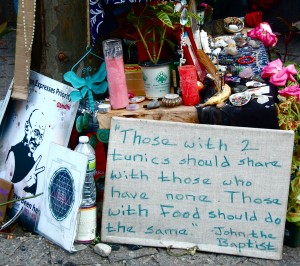 One of the constant threads in scripture is, "Give us this day our daily bread." Nothing more, nothing less. Underneath this admonition is the assumption that the more we store up for tomorrow the less people will have for today. And in a world where 1 percent of the world owns half the world's stuff, we are beginning to realize that there is enough for everyone's need, but there is not enough for everyone's greed. Lots of folks are beginning to say, "Maybe God has a different dream for the world than the Wall Street dream."
One of the constant threads in scripture is, "Give us this day our daily bread." Nothing more, nothing less. Underneath this admonition is the assumption that the more we store up for tomorrow the less people will have for today. And in a world where 1 percent of the world owns half the world's stuff, we are beginning to realize that there is enough for everyone's need, but there is not enough for everyone's greed. Lots of folks are beginning to say, "Maybe God has a different dream for the world than the Wall Street dream."
Maybe God's dream is for us to live simply so that others may simply live. Maybe God's dream is for the bankers to empty their banks and barns so folks have enough food for today.

